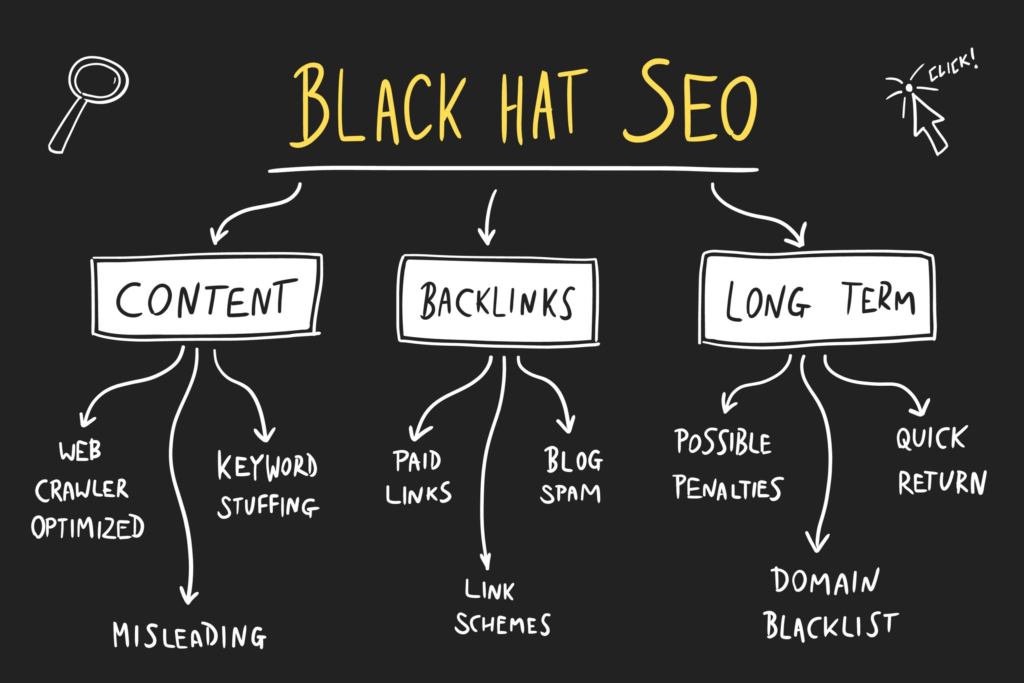Introduction
Search Engine Optimization is a pivotal component of online success, helping websites rank higher in search engine results pages (SERPs). However, not all SEO practices are created equal. Some adhere to ethical guidelines, while others resort to deceptive tactics to achieve short-term gains. This article will shed light on the unethical world of Black Hat SEO, revealing the risks and consequences associated with it.

The Dark Art of Black Hat SEO
Black Hat SEO refers to a set of unethical tactics employed by some individuals and organizations to manipulate search engine algorithms and achieve higher rankings. These techniques violate search engine guidelines and compromise the integrity of the digital landscape. Let’s explore some of the most common Black Hat SEO practices:
Keyword Stuffing: An Unethical Practice – Black Hat SEO
Keyword stuffing involves overloading web content with excessive keywords to manipulate search engines. While keywords are essential for SEO, stuffing them unnaturally into content results in a poor user experience and can lead to penalties from search engines.
Cloaking: Hiding the Truth from Search Engines -Black Hat SEO
Cloaking is a technique where a website displays different content to users and search engines. This deceptive practice aims to rank for keywords that are unrelated to the actual content, misleading both users and search engine crawlers.
Link Farming: The Web of Deception -Black Hat SEO
Link farming involves creating a network of websites with the sole purpose of generating backlinks to a target site. These backlinks are often low-quality and irrelevant, violating search engine guidelines.
Doorway Pages: The Illegitimate Entrance
Doorway pages are created solely for search engines, not for human users. They act as entry points to a website but provide little to no value to visitors. Search engines penalize websites that use doorway pages.
Content Automation: A Shortcut to Nowhere
Content automation involves using software to generate content automatically. While this may save time, it often results in low-quality, nonsensical content that damages a website’s reputation.
Hidden Text and Links: A Veil of Deceit
Some practitioners hide keywords or links within a page’s code, making them invisible to users but detectable by search engines. This manipulative tactic can lead to penalties.
Article Spinning: The Art of Recycling Content
Article spinning involves taking existing content and rewriting it to create the illusion of originality. However, the resulting content is often of poor quality and lacks value.
Negative SEO: Attacking Your Competitors
In a bid to gain a competitive edge, some resort to negative SEO tactics, such as creating spammy backlinks to a competitor’s website. This unethical practice can harm another website’s rankings.
The Consequences of Black Hat SEO
Engaging in it may yield short-term gains, but the long-term consequences are severe:
Search Engine Penalties: The Hammer Drops
Search engines like Google continuously refine their algorithms to detect and penalize Black Hat SEO practices. When caught, websites can face severe ranking penalties or even removal from search results.
Black listed Domains: A Digital Exile
Websites that persistently engage in it may find themselves black listed by search engines. This digital exile can be detrimental to a website’s online presence.
Loss of Trust: Alienating Your Audience
Engaging in unethical SEO practices can damage your brand’s reputation and erode trust with your audience. Users are quick to abandon websites that resort to deceptive tactics.
The Ethical Alternative: White Hat SEO
Rather than treading the treacherous path of it, opt for White Hat SEO practices. These ethical strategies focus on creating high-quality, valuable content, building genuine backlinks, and adhering to search engine guidelines. In the long run, White Hat SEO not only improves rankings but also fosters trust and credibility.
Conclusion
In the ever-competitive digital landscape, the allure of Black Hat SEO may be tempting, but the risks far outweigh the rewards. Engaging in unethical SEO practices can lead to penalties, black listing, and a loss of trust from your audience. Instead, choose the ethical path of White Hat SEO, where long-term success is built on a foundation of quality and integrity.

